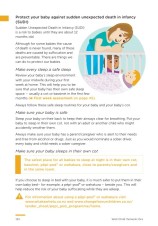If you're a frequent visitor to Healthify, why not share our site with a friend? Don't forget you can also browse Healthify without using your phone data.
Sudden unexpected death in infancy (SUDI)
Keeping your pēpi safe while they sleep
Key points about SUDI
- Sudden unexpected death in infancy (SUDI) is when a pēpi (baby) under 12 months old passes unexpectedly, often during sleep, with no immediate obvious cause.
- The journey to safe sleep starts before your pēpi is born.
- The 3 main risk factors are smoking during pregnancy, pēpi sleeping on their tummy or side, and bed-sharing – especially if the parent or caregiver smokes.
- It's normal to feel scared it might happen, but knowing what increases the risk, can empower you to make safe choices about your baby's sleep and feel more confident as a parent.

SUDI stands for Sudden Unexpected Death in Infancy and remains one of the main causes of preventable deaths for babies in Aotearoa New Zealand. It refers to the sudden, unexpected passing of a baby under 12 months old, often during sleep, with no immediate obvious cause.
SUDI includes what was previously called SIDS (Sudden Infant Death Syndrome) or cot death. These deaths are tragic and devastating for whānau.
It’s normal to feel scared when hearing about SUDI. But knowing what increases the risk – and how to reduce it – can help you feel more confident and empowered as a parent.
In the 1980s, Aotearoa New Zealand had one of the highest SIDS rates in the Western world – over 250 babies died each year which is more than 4 out of 1000 live births.
Thanks to national safe sleep campaigns, these numbers have dropped dramatically – to 44 deaths in 2015, and 40 deaths in 2020, including 27 from SIDS. That’s a rate of 0.7 deaths per 1000 live births, which has remained steady between 2016 and 2020.
Māmā and whānau, remember – you are tapu (sacred) while hapū. How your pregnancy unfolds, your birthing experience, and how you care for your pēpi in the early years shapes their wellbeing for life. The first 2,000 days of life – from conception to age 5 – are powerful. This is when pēpi builds the foundations of how they breathe, sleep, grow, connect, and learn.
The journey to safe sleep starts before your pēpi is born. Here are some simple things that can help lower the risk of SUDI:
- Eat nourishing kai to help your pēpi grow strong lungs and a healthy brain. This includes taking your prescribed supplements such as:
- folic acid during the first trimester (yellow pill), which supports the development of the central nervous system
- iodine (white pill) which supports pēpi's brain development and mama’s thyroid function
- iron (brown pill) to prevent anaemia by ensuring that you have enough red blood cells to carry kai and oxygen to your pēpi..
- From 28 weeks hapū, try to sleep on your side. This helps the flow of oxygen-rich blood to your pēpi while you rest.
- Stay smoke, vape, drug and alcohol-free. These are toxins that can damage your pēpi’s brain, breathing system and developing organs.
- Reduce stress by resting and seeking support. Chronic stress during pregnancy can lead to increased levels of cortisol, a stress hormone. High levels of cortisol can reduce the flow of blood to your womb, and affect the development of the placenta (whenua), which is important for delivering nutrients and oxygen to your pēpi and removing waste products.
Stop smoking or vaping
Quitting smoking or vaping before 15 weeks of pregnancy improves pēpi's development. It increases the oxygen reaching the baby and reduces the risk of them being born early or having a low birthweight.
If you smoke and are hapū, don’t feel judged – reach out for support. Talk to your midwife, healthcare provider, or local stop-smoking service. Tell your midwife if you're not able to stop, there may be extra steps needed to protect your baby. But many whānau stop smoking during pregnancy and never go back – for their babies, and for themselves.
There are 3 main risk factors for SUDI. The more of these risks pēpi is exposed to, the higher the chances of SUDI. The 3 biggest risks are:
- Māmā smoking during pregnancy.
- Pēpi sleeping on their tummy or side.
- Bed-sharing.
The most dangerous combination is smoking in pregnancy and bed-sharing – this increases pēpi's risk of SUDI by up to 32 times.
Other risks are baby sleeping in an adult bed, couch or car seat, caregiver drug or alcohol use, caregiver sleep deprivation and formula feeding.
Whānau most likely to experience SUDI in Aotearoa New Zealand
- Whakapapa Māori and Pasifika.
- Pēpi born to māmā under 25 years of age.
- Low income whānau.
- Babies born prematurely or small for gestational age.
- Pēpi who are twins or triplets.
- Whānau who have experienced SUDI before.
If you’re unsure or have questions, it’s okay to ask. Talk with your midwife, nurse, GP, or someone you trust. This is all about wrapping your pēpi in every layer of protection possible.
Safe sleeping practices
The PEPE message is a simple way to remember how to keep your pēpi safe while they sleep. It focuses on 4 key actions that reduce the biggest SUDI risks and protect many babies' lives in Aotearoa New Zealand.
P = Place
Pēpi sleeps in their own baby bed (wahakura, pepi-pod, cot or bassinet) in the same room as their parents of caregiver.
E = Eliminate
Stay smokefree during pregnancy and ensure pēpi’s world is smoke- and vape-free.
P = Position
Always place pēpi on their back to sleep, facing up to Ranginui, with their face clear of blankets.
E = Encourage
Breastfeed if possible and always handle pēpi gently. Breastfeeding provides rongoā (healing) and immunity for pēpi.
These simple steps help protect against pēpi:
- sleeping on their tummy or side
- being in unsafe bed-sharing setups
- being exposed to smoke
- getting too hot or getting blocked airways.
If you don't have a baby bed, you may be able to borrow a bassinet or pēpi-pod from Pregnancy Help(external link), or get a Special Needs Grant(external link) from Work and Income to buy one.
Video: TAHA – safe sleep for baby
(TAHA Well Pacific Mother & Infant Service, NZ, 2014)
Waiū (breastfeeding) protects pēpi
Waiū (breast milk) is a superfood for pēpi – it is food, hydration, rongoā (medicine), and aroha (love) all in one.
Breastfeeding protects them against SUDI by:
- boosting their immune system
- helping them sleep lightly and wake more easily
- reducing infections that affect breathing.
If possible, exclusively breastfeed for the first 6 months and continue through 2 winters if possible, or longer if it works for your whānau. Ask for support if you need it.
Every day you breastfeed pēpi, you place rongoā around them like a korowai – protecting their body and whakapapa. Even a little breastfeeding helps. The support of your partner and whānau to breastfeed will ensure your success and encourage you to keep breastfeeding your pēpi.
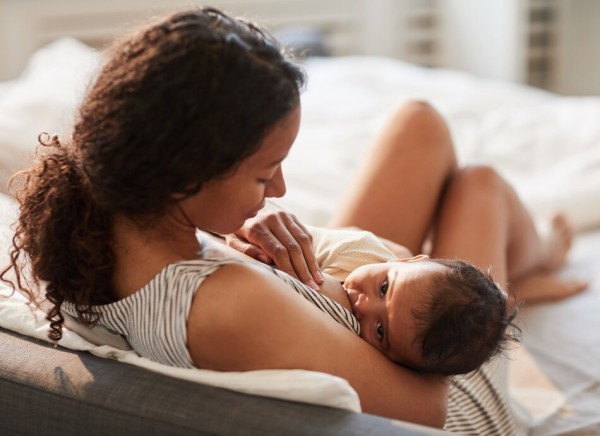
Image credit: Canva
Immunisation helps keep pēpi safe
Getting your pregnancy (antenatal) and baby (childhood) immunisations is one more way to protect pēpi from serious illnesses – even from things that could increase their risk of SUDI.
- Some viruses can hurt pēpi’s breathing, heart, or immune system. This can make it harder for their little bodies to recover, especially while they sleep.
- When you’re hapū, vaccines such as the flu and whooping cough (Boostrix) help your body make antibodies. These pass through the placenta and give pēpi a shield of protection until they’re strong enough for their own shots.
- When pēpi gets their vaccines on time – starting at 6 weeks – it builds their immune system to fight off dangerous illnesses such as pneumonia, meningitis, and whooping cough.
These illnesses can hurt their breathing, are linked to SUDI and can hit babies hard in their first few months. That’s why staying up to date with immunisations is so important – you’re wrapping them in a korowai of protection, helping their body to learn how to fight off serious illness early.
Oriori – singing love into pēpi's world
Oriori are traditional Māori lullabies sung to pass on values, soothe emotions and connect pēpi to their whakapapa. Let your oriori wrap your pēpi in aroha.
- You can write your own – in te reo, English or another language you love – with help from whānau.
- Sing it gently at sleep time. Your voice is medicine.
- You can also explore oriori from others. Learn more about oriori(external link).
Singing lullabies to babies is a cultural tradition all around the globe.
When you set up your baby’s bed, make sure:
- The mattress is firm and fits snugly, with no gaps on the sides
- There’s nothing baby can get wedged under or between
- There are no pillows, toys, bumper pads or necklaces
- Blankets and sheets don’t cover baby’s face
- Baby’s face is always clear – nothing should block their nose or mouth
- Baby is dressed for the room temperature (1 more layer than you wear)
Your pēpi sleeps safest in their own bed, in the same room as you – close enough for comfort, but in a protected space just for them. Make sure you warm up the room you share with pēpi. Place pēpi’s sleeping space away from the windows and drafts during the colder months and make sure you can get to them easily to check on them while they're asleep.
Tips for safe co-sleeping with your pēpi
Co-sleeping can help pēpi feel secure, connected, and calm – but it's important to do it in a way that keeps them safe while they sleep.
A Wahakura is a woven flax bassinet that pēpi can sleep in next to māmā or pāpā. It gives pēpi their own sleep space while still being close. Wahakura help prevent pēpi from being rolled on or covered by bedding. They were first tried out in Gisborne and Hawke’s Bay and are now used across the country.
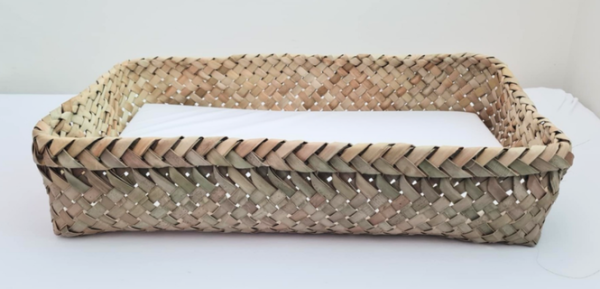
Image credit: Healthify He Puna Waiora
A pēpi-pod(external link) is a portable plastic sleep space with a firm mattress. Like the wahakura, it keeps pēpi close to you but safely separate, helping to reduce the risk of being suffocated by accident.
Always sleep pēpi on their back with their feet at the base of their sleep space. This keeps their face clear and stops them from sliding under the blankets. After feeding, always return them to their own sleep space before you fall asleep.
Keep the sleep space smoke-free – make sure your whare, waka, and sleeping area are smoke- and vape-free. Caregivers should also avoid alcohol or drugs, so they stay alert to pēpi’s needs.
Keep their face and head uncovered – avoid hats, soft toys, pillows, bumper pads, and necklaces. These can block pēpi’s airway (breathing) or cause choking or overheating.
Dress them for the temperature – dress pēpi in just 1 extra layer than you’d wear. Too many clothes or thick blankets can lead to overheating, which increases SUDI risk.
Use a firm, snug-fitting mattress – in a wahakura, pēpi-pod, cot or bassinet, always use a firm, flat mattress that fits well. This keeps pēpi from rolling into gaps or sinking into soft surfaces.
Whānau support – if you’re feeling tired or overwhelmed, ask a trusted whānau member to awhi (support) you. Everyone needs rest.
If you or someone you love has experienced the heartbreak of losing a baby, you're not alone. There are places to turn for aroha and support:
Sands NZ(external link) Offers support for whānau who have experienced baby loss during pregnancy, birth or infancy.
Bittersweet(external link) An Australia-based community that supports families grieving the loss of a child, open to Aotearoa New Zealand parents too.
You might also like to honour your pēpi by writing an oriori, planting a tree, or creating a keepsake. Your grief journey is yours – there is no right or wrong way to feel.
Sleep on side when baby's inside campaign(external link) Cure Kids, NZ
Brochures
Protect your baby against sudden unexpected death in infancy (SUDI)(external link) Well Child Tamariki Ora
Keep your baby safe during sleep(external link) HealthEd, NZ, 2023
Safe sleep for P.E.P.E [PDF, 222 KB] Hāpai SUDI Prevention Co-ordination Service, NZ
When a baby brother or sister dies(external link) HealthEd, NZ, 2022
Everyone please(external link) HealthEd, NZ, 2022
References
- Cronin RS, Thompson JMD, Taylor RS. et al. Modification of maternal late pregnancy sleep position – a survey evaluation of a New Zealand public health campaign(external link) BMJ Open 2021;11:e047681.
- National SUDI Prevention Programme – needs assessment and care planning guide(external link) Ministry of Health, NZ, 2019
- Thornburg KL, Boone-Heinonen J, Valent AM. (2020). Social determinants of placental health and future disease risks for babies(external link) Obstet Gynecol Clin North Am 2020;47(1):1–15
- Encouraging smoke free pregnancies – the role of primary care(external link) BPAC, NZ, 2013
- Smoking during pregnancy – risks and how to quit(external link) MedicalNewsToday, US, 2022
- Immunisation in pregnancy and when breastfeeding(external link) Immunisation Advisory Centre, NZ, 2024
- SIDS/SUDI – fetal and infant deaths web tool(external link) Health New Zealand | Te Whatu Ora, NZ, 2025
- Mitchell EA, Thompson JMD, Zuccollo J. et al. (2017). The combination of bed sharing and maternal smoking leads to a greatly increased risk of sudden unexpected death in infancy – the New Zealand SUDI Nationwide case control study(external link) NZ Med J. 2017; 130(1456):52–64
- SUDI(external link) Auckland Community HealthPathways, NZ, 2024
See our page SUDI for healthcare providers
Brochures
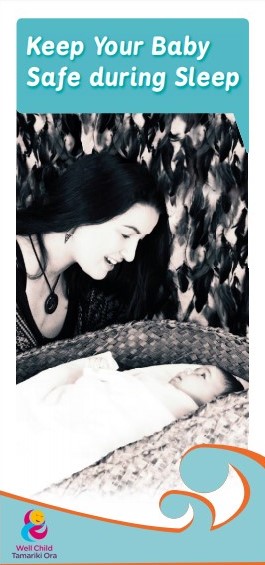
HealthEd, NZ, 2023
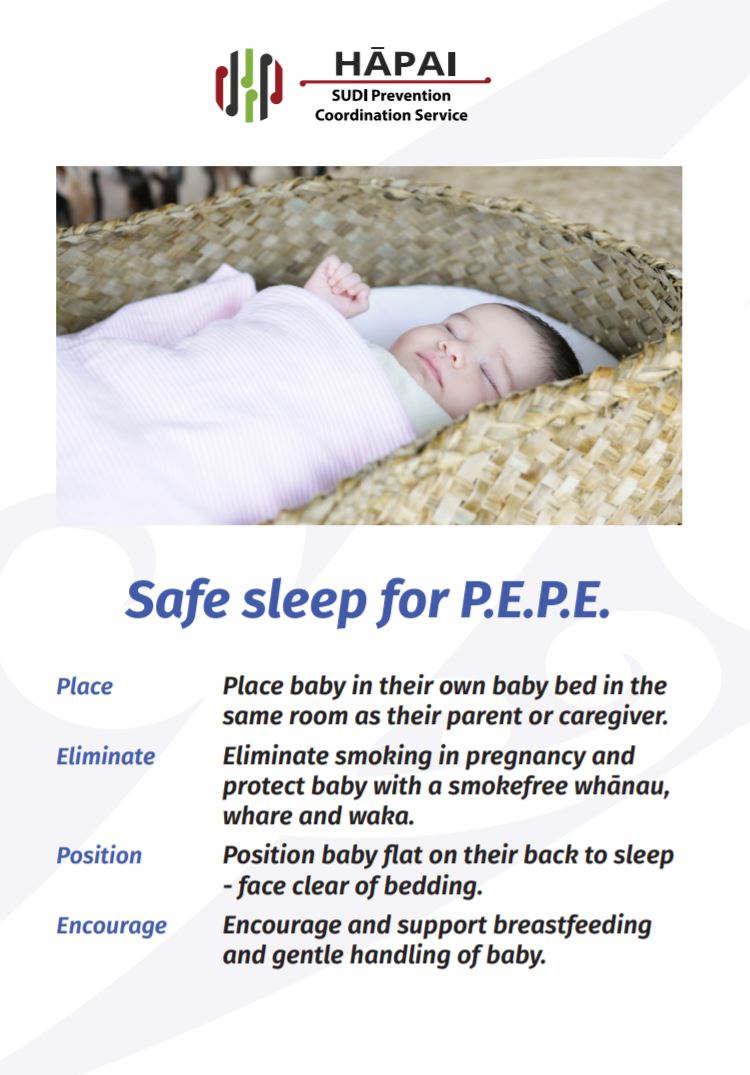
Hāpai SUDI Prevention Co-ordination Service, NZ
Credits: Healthify editorial team. Healthify is brought to you by Health Navigator Charitable Trust.
Reviewed by: Mrs Kaniwa Kupenga-Tamarama, Ngāti Maui | Ngāti Porou | Ngati Apakura | Ngati Hikairoa, BHSc Midwifery, PG Dip Midwifery, Dip Life Coaching, Director, Kia Kaha Māmā
Last reviewed:


